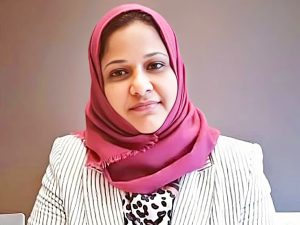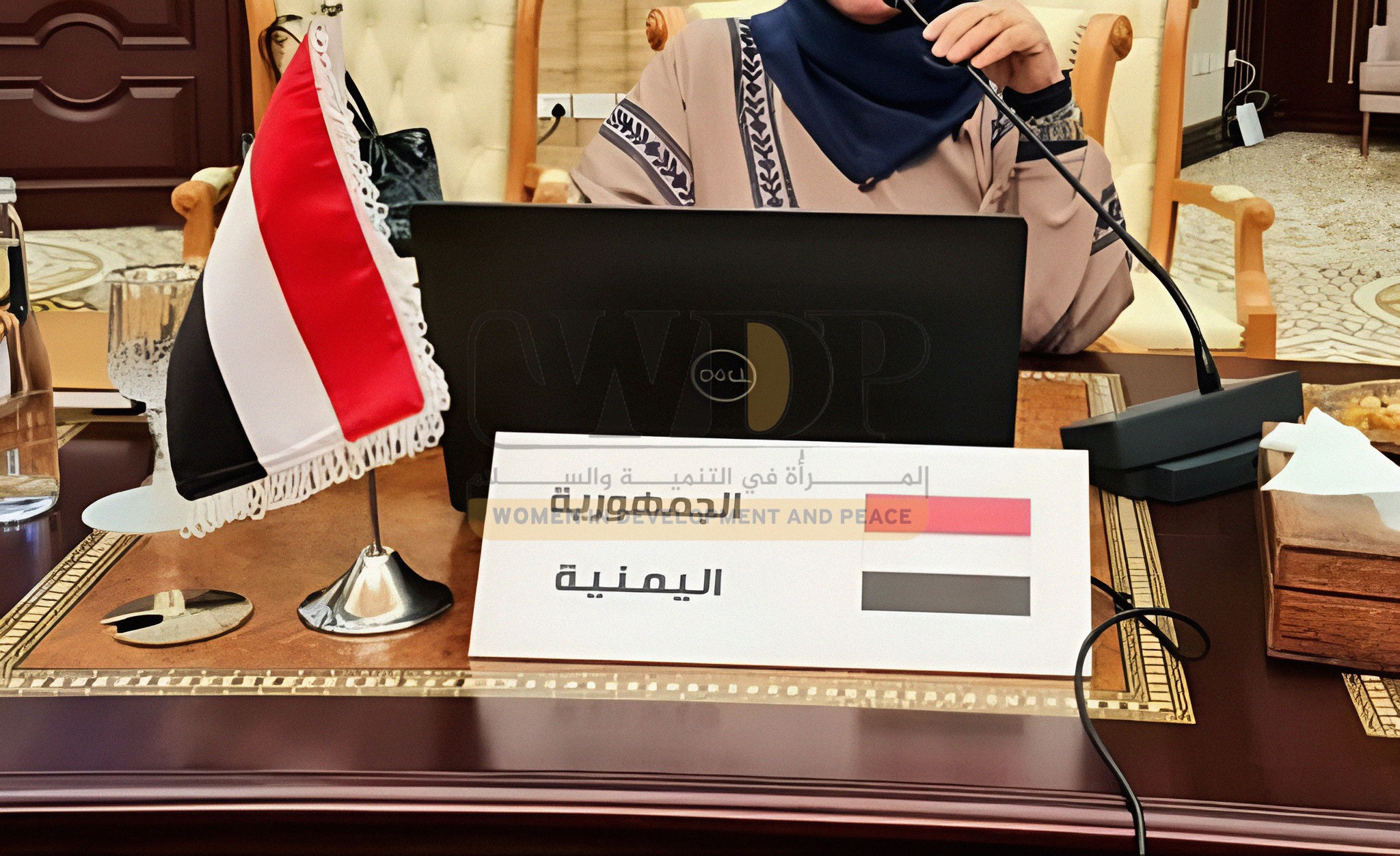 Athar Ali
Athar Ali
Executive Director of PASS Foundation
Member of the Local Team for Implementing the National Women, Peace, and Security (WPS) Agenda
Gender and Peacebuilding Consultant (Women’s Advisor in Diplomatic Work)
Have you ever imagined a Yemeni woman serving as an ambassador, representing our nation? How many times have you followed the diplomatic accomplishments of Yemeni women as they break down constraints and defy entrenched customs in our Yemeni society?
All the difficulties and obstacles facing Yemeni women highlight the will of its women as rays of light piercing the darkness, carrying the banner of equal participation in various fields, including the diplomatic corps. Yemeni women have always played an important role in various aspects of life, and the diplomatic corps was no exception. Since the dawn of history, Yemeni women have written bright stories in the field of diplomacy and faced many challenges but continued to strive to achieve their goals and serve their country.
Yemen is among the Arab countries that have made progress in women’s participation in the diplomatic sphere. According to a report from the Yemeni Ministry of Foreign Affairs in 2022, the representation of women in the Yemeni diplomatic corps has increased since 2000. However, despite the outcomes of the National Dialogue Conference stipulating that women’s participation should not be less than 30%, we observe that appointments since 2014 have not consistently met this target.
Historically, Yemeni women have shattered barriers of marginalization and exclusion. From the 20th century until today, they have held various positions within the diplomatic corps. Notable examples include Amat Al-Aleem Al-Suswah, Ramziyya Al-Iryani, Ilham Mabjar, Jamila Ali Rajaa, Dr. Mervat Majli, Sahar Ghanim and many others. Over the years, Yemeni women have held various diplomatic positions, demonstrating their resilience, struggle, and commitment to empowering women. However, statistics reveal varying levels of female representation in diplomatic roles, emphasizing the urgent need for further empowerment.
A report by the Civil Rights and Feminist Coalition (KARF) on the implementation of the Convention on the Elimination of All Forms of Discrimination Against Women (CEDAW) highlights the limited representation of women in senior diplomatic positions. Currently, there are only three female ambassadors. Additionally, retired female ambassadors contribute to this legacy.
| Job Title | Male | Female | Total | Women’s Percentage |
| Minister | 4 | – | 4 | – |
| Ambassador | 168 | 11 | 179 | 6.1% |
| Deputy Minister | 70 | 6 | 76 | 7.9% |
| Advisor | 53 | 3 | 56 | 5.4% |
| First Secretary | 123 | 25 | 148 | 16.9% |
| Second Secretary | 74 | 17 | 91 | 18.7% |
| Third Secretary | 104 | 27 | 131 | 20.6% |
| Diplomatic Assistant | 53 | 12 | 65 | 18.5% |
| Administrative | 170 | 25 | 195 | 12.8% |
| Total | 819 | 126 | 945 | 13.3% |
Source of Ministry of Foreign Affairs 2018
Yemeni female diplomats have achieved remarkable diplomatic accomplishments. They have contributed to enhancing Yemen’s relations with other countries and supported Arab and Islamic issues. Many of them have received international awards and recognition for their impactful achievements. Additionally, they efficiently represent their country in various international forums, including conferences, meetings, and global forums, alongside their male Yemeni diplomatic counterparts.
As we approach International Women in Diplomacy Day, celebrated annually on June 24th, it’s essential to recognize the outstanding role played by female diplomats worldwide. This day was established during the seventy-sixth session of the United Nations General Assembly on June 14, 2022. It acknowledges the pivotal role of women in promoting international cooperation, achieving peace, and establishing principles of security, stability, and peace globally. Furthermore, it aligns with the pursuit of sustainable development.
Breaking Constraints and Challenging Traditions
Yemeni woman has faced numerous challenges in the diplomatic field, but she managed to break these barriers and prove her ability to succeed in this domain. The Yemeni woman serves as an inspiring model for women around the world, demonstrating her capacity to achieve great accomplishments despite difficult circumstances. She has overcome various challenges, including the following:
- Gender Bias: Some societies still view diplomacy as a profession for men due to customs and traditions. Yemeni women face opposition from their families or communities when pursuing a diplomatic career, especially if it involves traveling abroad. The ongoing conflict in our country since 2015 has also made it challenging for Yemeni women to work abroad, leading many female diplomats to leave their positions and return to Yemen. Additionally, women struggle to access deserving opportunities and promotions.
- Work-Life Balance: Women may encounter challenges in balancing work and personal life, particularly due to insufficient support from employers or family members.
- Lack of Training and Development Opportunities: Yemeni women do not receive the same professional training and development opportunities as men, especially in the diplomatic field. This hinders their career and diplomatic progress
The Impact of The Conflict on Yemeni Women in Diplomacy
The ongoing conflict in Yemen has had a devastating impact on all aspects of life, and the diplomatic sector has not been an exception to these effects that have engulfed all of the country’s -affiliated sectors and institutions. Yemeni women in the diplomatic field have faced numerous challenges due to the continued conflict in Yemen. These challenges include budget cuts affecting all sectors, including the Ministry of Foreign Affairs, which has affected employment opportunities for Yemeni women in diplomacy.
Furthermore, the increased violence against women in Yemen during the conflict has made it difficult for Yemeni women to secure suitable employment in safe and supportive environments across various fields, especially in diplomacy. The closure of several Yemeni embassies abroad due to the conflict has resulted in many Yemeni women losing their jobs and remaining in Yemen.
Women’s participation in the negotiation process during various stages over the past years has been extremely limited. The United Nations Security Council Resolution 2216 was unresponsive to gender considerations from all conflict parties in Yemen, to the extent that peace talks were conducted without any presence or representation of Yemeni women.
Resilience Against Challenges
Yemeni women working in diplomacy have demonstrated immense resilience, perseverance, and determination to continue their work. Despite the risks and difficulties, they face, many Yemeni women have persisted in their diplomatic careers, especially during the ongoing years of conflict. Yemeni women have also played a crucial role in peace efforts within Yemen by representing their country on international platforms and working towards peaceful conflict resolution.
With all that has been mentioned, it is clear that there are numerous opportunities for Yemeni women to break free from discriminatory constraints, challenge unjust norms, and move forward with more dedication and inspiration. Civil society has also played a significant role in supporting Yemeni women diplomats and other sectors. Women’s civil society organizations have contributed to the dissemination of UN Security Council Resolution 1325 and its complementary resolutions. This empowerment enables women to participate politically and diplomatically, engage in consultations and dialogues, and propose additional priorities in critical areas. Workshops have been conducted on guidelines for international and local organizations regarding gender-based violence, funded by the United Nations Population Fund in 2020. Advocacy campaigns and coalitions within women’s networks further enhance women’s roles in peace processes and diplomatic work.
Recommendations
The necessary recommendations or proposals to enhance women’s participation in diplomacy need to be divided into multiple axes. For example, but not limited to:
At the Government Level:
- Increase women’s representation in senior diplomatic positions, such as ambassadorships and permanent representatives in international organizations.
- Allocate specialized training programs for women in the field of diplomacy and provide opportunities for exchanging experiences with diplomats from various countries.
- Support women’s participation in international diplomatic conferences and events.
- Allocate sufficient budget to enhance women’s participation in the diplomatic corps.
- Set a minimum quota of 30% for women in public service, political roles, peace negotiations, negotiation delegations, and all peace committees and political operations during the transitional period.
- Take measures to ensure that the peace agenda is responsive to gender considerations, including official consultations with women in the negotiation process, including rural women and conflict survivors, to prioritize their inclusion in any political settlement.
- Oblige the government to train and build the capacities of women working in the diplomatic corps
On The Level of Civil Society:
- Raise awareness about the importance of women’s participation in diplomatic work and challenge traditional ideas that still hinder women’s participation in this field.
- Provide support to women interested in diplomatic work by offering training, guidance, and counseling.
- Organize campaigns to promote women’s participation in diplomatic elections.
Regarding Women:
- Increase women’s interest in diplomatic work and strive to obtain the necessary education, training, and skill development.
- Actively participate in diplomatic conferences and events.
- Build networks with diplomats from different countries.
- Use social media to promote active women’s participation in diplomatic work.
Despite the challenges, hope blooms. Yemeni women have demonstrated their determination and resilience, breaking free from past constraints and challenging entrenched norms. They have become active contributors to building an institutionalized civil country. Their inspiring stories within the diplomatic sphere embody their ability to contribute to peace, justice, and sustainable development.
Together, we can create a better future for Yemeni women across various sectors, including diplomacy. It’s time to open doors to more opportunities, allowing them to be voices of peace and reconciliation, especially during these exceptional circumstances Yemen is facing. As Nelson Mandela once said, “Do not limit your potential; what seems impossible today may be within your grasp tomorrow”

